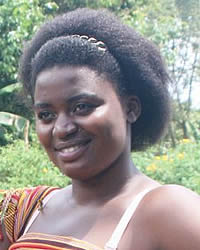Somali Bantu in Somalia

Photo Source:
Emmanuel Adiba - Wikimedia
Creative Commons
|
Send Joshua Project a map of this people group.
|
| People Name: | Somali Bantu |
| Country: | Somalia |
| 10/40 Window: | Yes |
| Population: | 951,000 |
| World Population: | 1,129,400 |
| Primary Language: | Maay |
| Primary Religion: | Islam |
| Christian Adherents: | 0.05 % |
| Evangelicals: | 0.05 % |
| Scripture: | Portions |
| Ministry Resources: | No |
| Jesus Film: | Yes |
| Audio Recordings: | Yes |
| People Cluster: | Bantu, Swahili |
| Affinity Bloc: | Sub-Saharan Peoples |
| Progress Level: |
|
Introduction / History
The Somali Bantu are a group of black African communities in southern Somalia, where they also call themselves Jareerweyne. Some of them were brought to Somalia in the 1800s as slaves, while others have lived in Somalia for many centuries. They are united by their second-class status within Somali Society and by the racial discrimination and persecution they have faced there.
Traditionally, most Somali Bantus live as farmers along the Juba and Shabelle rivers in Somalia, planting maize, sesame, and vegetables, in addition to hunting and fishing. Over time, much of their farmland was taken away, first by the colonial government, then later by the Somali elites. Many became wage laborers on plantations or moved to the cities to find jobs.
More recently, the traditional homeland of the Somali Bantu has been under the control of Al Shabaab terrorists and many Somali Bantu have faced oppression and violence from them. Young men are forcibly recruited to fight for the terrorists and young women are forcibly married to Al Shabaab fighters. Farmers are taxed heavily, and the entire community is forced to abide by Al Shabaab's extreme version of Islam. Because of these hardships, Somali Bantu continue to leave their villages and seek refuge in other parts of Somalia or in neighboring Kenya.
The majority of Somali Bantu are still living in their traditional villages along the Juba and Shabelle rivers of Somalia, as well as in the agricultural areas of Baay and Bakool. Many Somali Bantu also live in large cities across southern Somalia, especially in Mogadishu, Kismayu, and Baidoa. Some have found jobs there, while others live in camps for internally displaced people (IDP). A significant number of Somali Bantu have left the country and now live in Kenya and the United States.
What Are Their Lives Like?
As a marginalized community within Somalia, many Somai Bantu have very little education and live in poverty. They face discrimination and exploitation and are often the targets of criminals. In the villages, their lives are centered around traditional small-scale agriculture, which is affected by frequent droughts and flooding. In the cities, many Somali Bantu women are domestic workers for Somali families and many men work in construction and casual labor. Many girls are married off at a very young age and generally children are expected to contribute their labor.
What Are Their Beliefs?
Almost all Somali Bantu are Sunni Muslims, though most of them have little knowledge of Islam. Those living under Al Shabaab rule have to conform to very strict Islamic rules and are forbidden much of their cultural practices. Traditionally, many Somali Bantu believe in or even practice witchcraft and spirit possession cults, but these animistic practices are often persecuted in Somalia.
A very small number of older Somali Bantu adopted Christianity in the 1960s and 1970s, when Catholic and Mennonite missionaries served in their area of Somalia. Most of them did not pass on their faith to their children and many have fled the country due to persecution or have been killed by Islamic extremists.
What Are Their Needs?
The Somali Bantu have a wide range of physical and social needs. They need freedom from oppression and safety from violence and exploitation. Many need livelihood support to mitigate the effects of droughts, floods, and forced displacement. Most need access to better healthcare to bring down child mortality rates, and access to better education.
They also have a wide range of spiritual needs. Very importantly, they need freedom of religion and safety from persecution by Islamic extremists. They need access to Gospel materials in their language and opportunities to meet believers. They need basic education to read and understand Scripture as well as access to theological training to build up an indigenous church.
Prayer Points
Pray for God to deliver the Somali Bantu from the terror of Al Shabaab.
Pray for protection for their young men and women to be forced into service of the terrorist organization, and for the opportunity to live their lives freely.
Pray for access to outside resources, including the internet and gospel resources.
Pray for believers to reach the Somali Bantu in urban centers like Kismayo or Mogadishu.
Pray for the health and educational services offered by believers to make a positive impact in the community. Pray for opportunities to share the gospel.
Pray for the Holy Spirit to be at work in the community, even where all access seems impossible.
Pray for hearts to be changed and lives transformed.
Pray for strong faith in the face of all hardships, and for those who believe to share their faith with their families and friends.